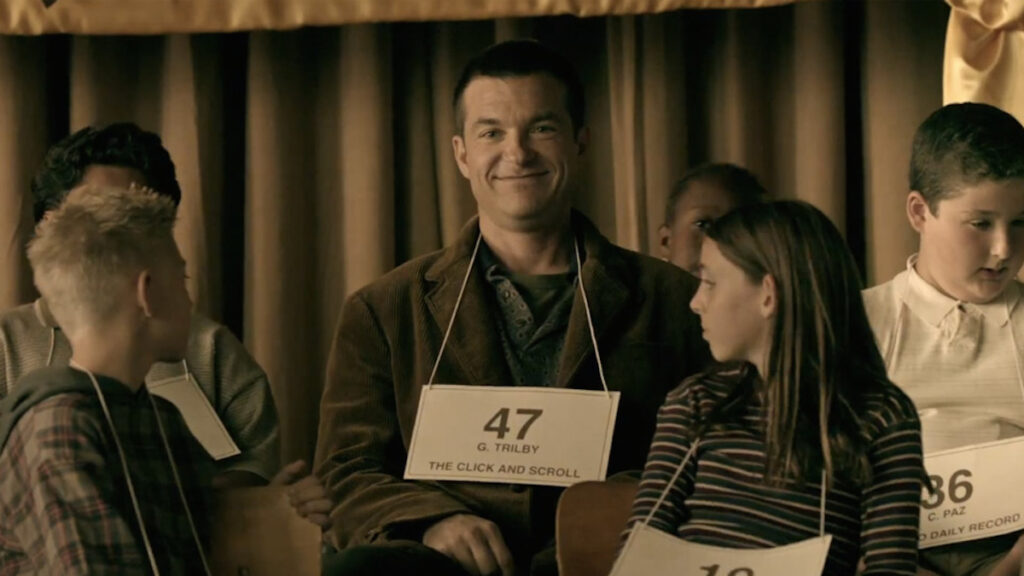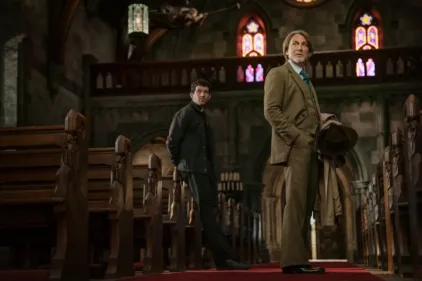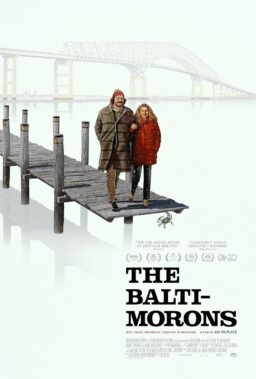Jason Bateman directs and stars in “Bad Words,” the story of an angry man determined to compete in a national spelling bee competition for middle schoolers. Through a loophole in the rules, he manages to qualify, and he is befriended by one of the children, played by newcomer Rohan Chand. I talked to him about what draws him to roles where the emotion is very contained, why he cast himself as the lead, and how he, as a former child star, worked with Chand to keep him comfortable and engaged in the midst of a very R-rated film.
You tend to play characters who keep a lot inside, who have a lot of anger inside but express it in an understated way. What are the challenges of conveying a character like that?
The challenge is not to do it too obviously. For my money when I go and I see something I want to have to lean in a little bit to see what’s going on with the characters as opposed to be shown what’s going on with the character or told what’s going on with the character. So I try to be as settled as possible and sometimes that means asking the cameraman, “What lens are you using?” so you kind of know how close they are and if you want to play, you know, the character is nervous and they’re not wide enough to see your hand twitching. Then you know to use a piece of your body that is in the shot. You can modulate it in different ways. With anger that is something pretty obvious to see and it becomes a little trickier to hide. Fear or being unsure is something that I like to kind of put in characters. And there’s different ways to show that. There’s certainly a dramatic way to show that and also a comedic way to show that. This character was certainly an important one to try to inject as much vulnerability and doubt as possible because he is the opposite of that in his veneer. To try to strike a palatable balance I needed to look for the opportunities to show that crack, so that the audience would gets on board with him and not hate him.
It’s incredibly beneficial in that effort that this young kid who’s like the sweetest, sunniest least judgmental person you could ever imagine is super eager to be friends with him. He just thinks this guy is hilarious. That afforded the character and me as the actor the chance to take even bigger swings comedicaly because he was constantly validating this character. It was a fun combo.

You have had a lot of opportunities to observe different directors. What are some of the techniques or ideas you’ve seen that you tried to bring to this movie?
As actors you get to cherry pick all of the good and none of the bad and so I think it’s not a mystery. A lot of actors turn to directing and make pretty decent ones. On the whole, a director who make the set a comfortable place to work is really important whether it’s a comedy or drama.
You know we’re a thin breed. Actors, by very definition, we want people to pay attention to us and so usually that comes in the package of insecurity. So if we’re not comfortable we don’t really show you a lot. And acting is showing you humanity I guess. We’re trying to show facets of it and if you’re not confident or if you’re feeling insecure, that’s not a very exciting performance to watch. So if you can make it a comfortable place, if you can help make your actors confident and certainly on a comedy to have it be a loose set, then you’re doing half the job.
This cast has many of my favorite performers into this movie, including Philip Baker Hall, Allison Janney and Kathryn Hahn.
With Allison and Kathryn I just called them because they’re friends of mine. I didn’t see anybody else playing these characters but them. With Philip Baker Hall he’s just somebody I’ve just admired for a long time and knew that if he by any chance would say yes he would lend a great deal of pedigree to the film. With something like this, there is a very silly, gratuitous, arbitrary version of it that is just waiting right behind the door and if you don’t have high quality cast that’s lending their pedigree to the film, and if there is a visual aesthetic that feels a little bit wrong if it scored with campy music, if it’s marketed in a way that’s kind of popcorny, it just becomes a little distasteful. So, there was an effort to try to put and as high a quality presence in every department as possible and certainly the cast was that.

There were some unexpected and varied music choices in the film. What’s on your iPod?
I’m very, very limited in my knowledge of current music, embarrassingly so, but this character is a little bit of the Beastie Boys and Smashing Pumpkins, definitely bands he’d really dig and not be super interested in stuff that is postmodern. There is a swagger to those guys that would appeal to him. We were incredibly lucky that those bands agreed to lend their music to the film. The score, on the other side of the spectrum, was done by Rolfe Kent, who has done Alexander Payne‘s films and Jason Reitman‘s films and really understands how to enhance and support the character. Again, that was very important to try to feature in this film as opposed to playing this character or these characters in a one dimensional way. If you try to fill them out in as real way as possible then again your comedy which is comes as hammer sometimes feels a little bit more sophisticated and helps you to enjoy it a little bit more.
Who are some of your comedy idols in terms of movies?
I really like dramas that have a tone of comedy in them or the opposite, and those are done by people like Alexander Payne and Jason Reitman but also Spike Jonze and David O. Russell and Paul Thomas Anderson, the Coen Brothers. They’re always kind of dealing in a world that is kind of adjacent to traditional society and that’s interesting to me. Not only the characters in them but the situations that they are susceptible to falling into and there’s often an aesthetic to those films that supports that fringe. It’s a really exciting thing to collaborate with production designers, cinematographers and gaffers and costume designers and editors and composers. They all help to create a very specific and unique world that makes it believable that these kinds of characters exists and these kinds of decisions.
Having been a child actor yourself, does that help you to direct a child?
Certainly in trying to create a comfortable atmosphere for him it did. And he was incredibly gifted. He knew what we were going for and I think he knew what we needed out of that character. Whether he was aware of it or not consciously, he knew when to bring the sunshine and when to hold back. I always kind of found that balance in all of our scenes together. Plus he was very open to me directing him. He understood direction he understood how to take it . Some of the words I might give him to try to motivate a certain emotion were a little over his head. So sometimes it got very sort of primary, in the direction all the way down to just like giving him a line reading which he was open to. I loved getting a line reading as an actor because the a director can say “say it like this” and you say it exactly the way he wants it and you’re never gonna say it exactly the same way he wants it, but there is an efficiency in trying to communicate the spirit of it. Just by the inflection of one word sometimes you can save ten minutes of trying to find the emotional word that jars that kind of reading. It’s like, you know, just give me the line reading and I’ll understand what you’re trying to say.
Were you always committed to starring in it as well?
No. I just wanted to enjoy the directing process in full but after my first two choices said no before we went to a third one I thought, “Maybe I would cut my workload a bit by not having the director/lead actor and also might increase my odds by hitting the tone target that I wanted by being in front of and behind the camera?”

I don’t think that most people would’ve thought that would decrease their workload.
Well, there’s a creative negotiation that happens between actors and directors throughout shooting films because a director is kind of has to resist the instinct to give a note to change a performance just simply because it doesn’t sound or look like the way that he or she always thought of it. For better or worse I got exactly what I wanted out of it.
Did your young co-star’s family have any concerns about the very adult material in the movie?
Of course, sure, although they understood the nuance in the script and I supported all of those assumptions that they had. It seems as if there was something slightly more elevated here. Certainly the lead character has some sort of emotional agenda at play here as opposed to just being a prankster and in fact that is what drew me to this script. So I was very specific in how I described that to Rohan’s father and mother and assured them that the movie is certainly not for everyone by any stretch but the effort certainly was there, we try to give it a little bit more substance than perhaps a different version of the movie.
You took on a character who is, at least on the surface, unlikeable, often insulting and crude. How do you make him, in his way, the hero?
We had to be really mindful of showing a balance to his cynicism. It was very much on purpose to start the film in that world in that tone because I think that’s a much harder thing to establish once you’ve already shown the veneer. I think you have to show the inside of the character first because an audience is wide open to anything you want to give them in the first five minutes so, starting with the introspective narration, sort of the melancholy views of kids with their parents, Beethoven’s First Symphony. There was just a lot of stuff that together perhaps establish his soft chewy center before we showed that hard veneer that he goes into as soon as he jumps up on stage of the regional competition. Now you’re showing us both sides and now perhaps his prickly veneer is something that we will excuse a little bit more because we the audience know more about this guy than the people that he’s abusing. So he’s a bit of our guy, you know, and have a little empathy perhaps from the beginning. I mean, he’s apologizing in the narration so it is all done in retrospect. It can be crutch-y, but I needed the narration because I wanted to swing that much harder with the comedy. Once I saw it all kind of put together there were moments that I needed to apologize a little a bit more before you see what you’re going to see. So, it was a necessary easily evil I felt in this one and perhaps if I’d done a better job as a filmmaker to round those edges with images or musically, maybe I could have gotten the same effect. So I was happy with but I look forward to having a length of shooting schedule where perhaps I build some images that might show some things that instead of saying some things.












